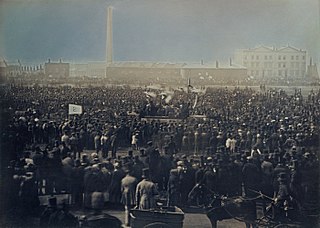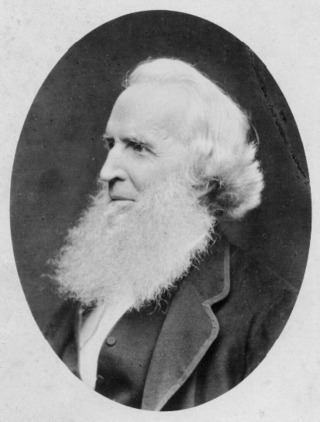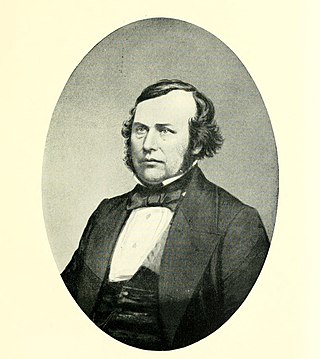
Chartism was a working-class movement for political reform in the United Kingdom that erupted from 1838 to 1857 and was strongest in 1839, 1842 and 1848. It took its name from the People's Charter of 1838 and was a national protest movement, with particular strongholds of support in Northern England, the East Midlands, the Staffordshire Potteries, the Black Country and the South Wales Valleys, where working people depended on single industries and were subject to wild swings in economic activity. Chartism was less strong in places, such as Bristol, that had more diversified economies. The movement was fiercely opposed by government authorities, who finally suppressed it.

Birmingham Museum and Art Gallery (BM&AG) is a museum and art gallery in Birmingham, England. It has a collection of international importance covering fine art, ceramics, metalwork, jewellery, natural history, archaeology, ethnography, local history and industrial history.

Sutton Coldfield or the Royal Town of Sutton Coldfield, known locally as Sutton ( ), is a town and civil parish in the City of Birmingham, West Midlands, England. The town lies around 8 miles northeast of Birmingham city centre, 9 miles south of Lichfield, 7 miles southwest of Tamworth and 7 miles east of Walsall.

Sir Josiah Mason was an English industrialist, engaged in pen manufacture and other trades, and a philanthropist. He founded Mason Science College in 1875, which later became the University of Birmingham.

Joseph Gillott was an English pen-manufacturer and patron of the arts based in Birmingham.

Feargus Edward O'Connor was an Irish Chartist leader and advocate of the Land Plan, which sought to provide smallholdings for the labouring classes. A highly charismatic figure, O'Connor was admired for his energy and oratory, but was criticised for alleged egotism. His newspaper Northern Star (1837–1852) was widely read among workers, becoming the voice of the Chartist movement.

Joseph Sturge was an English Quaker, abolitionist and activist. He founded the British and Foreign Anti-Slavery Society. He worked throughout his life in Radical political actions supporting pacifism, working-class rights, and the universal emancipation of slaves. In the late 1830s, he published two books about the apprenticeship system in Jamaica, which helped persuade the British Parliament to adopt an earlier full emancipation date. In Jamaica, Sturge also helped found Free Villages with the Baptists, to provide living quarters for freed slaves; one was named Sturge Town in his memory.

Sir Richard Trevithick Tangye was a British manufacturer of engines and other heavy equipment.
Dorothy Katharine Gane Thompson was a social historian and a leading expert on the Chartist movement. She and her husband E. P. Thompson became well-known in left-wing intellectual circles.

George Julian Harney was a British political activist, journalist, and Chartist leader. He was also associated with Marxism, socialism, and universal suffrage.

The Northern Star and Leeds General Advertiser was a chartist newspaper published in Britain between 1837 and 1852, and best known for advancing the reform issues articulated by proprietor Feargus O'Connor.

Sir John Benjamin Stone was a British Conservative politician and photographer.
The Office of High Sheriff of the West Midlands is the ceremonial position of High Sheriff appointed to the West Midlands, a metropolitan county in central England. The appointment is made by the British monarch by Pricking the Lists. Created in 1974, the office of High Sheriff of the West Midlands has the duty to "protect and assist in upholding the dignity and well being of His Majesty’s judges and to represent the King's executive powers in respect of the administration of justice in the county". The Office of High Sheriff is normally awarded to people of stature in the West Midland who have significantly and positively contributed in some way to the county's community either through voluntary work or through commerce or industry.
The Folklore Society (FLS) is a registered charity under English law based in London, England for the study of folklore. Its office is at 50 Fitzroy Street, London home of the Royal Anthropological Institute of Great Britain and Ireland.
Peter Frederick Blaker Bennett, 1st Baron Bennett of Edgbaston, Kt, OBE, JP, known as Sir Peter Bennett between 1941 and 1953, was a British businessman and Conservative Party politician.
Joseph Mendham (1769–1856) was an English clergyman and controversialist.

Owen Percy Parsons LRIBA was an English architect who designed both speculative housing for rent and larger private commissions.

Robert Buchanan (1813–1866) was a Scottish socialist writer and lecturer, and journalist.
Robert Blakey (1795–1878) was an English writer and academic, a Chartist radical and journalist. He is known also for works on fishing.
Miles Taylor, FRHistS is a historian of 19th-century Britain, and an academic administrator. Since 2004, he has been a professor of history at the University of York and between 2008 and 2014 he was director of the University of London's Institute of Historical Research.












